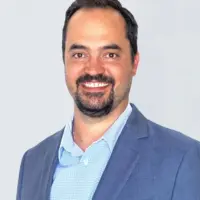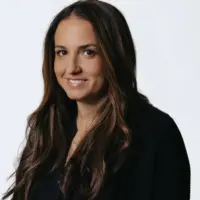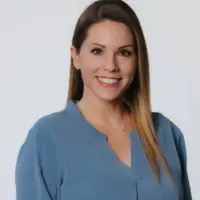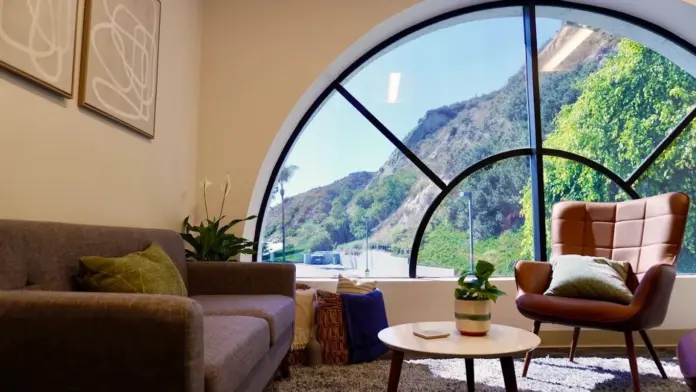About Evolve Teen Treatment Center – San Diego Outpatient
Evidence-Based, Individualized Care
Our treatment model is rooted in proven, evidence-based approaches, with a strong emphasis on Dialectical Behavior Therapy (DBT) and Cognitive Behavioral Therapy (CBT). All of our programs provide adherent DBT skills training to help teens build practical tools for emotion regulation, distress tolerance, interpersonal effectiveness, and mindfulness. We also integrate modalities like Motivational Interviewing, Seeking Safety, Relapse Prevention, Behavioral Activation, and SMART Recovery when appropriate. Every teen receives a customized treatment plan developed by our multidisciplinary team.
Residential, PHP, and IOP Programs
Evolve offers a full continuum of care, including residential treatment centers across California, as well as partial hospitalization (PHP), intensive outpatient (IOP), and virtual outpatient therapy and psychiatry. Our residential programs combine individual, family, and group therapy with psychiatry and a wide range of experiential therapies such as equine-assisted therapy, art, surf, music, drama, yoga, and fitness. Teens also receive daily academic support to help them stay on track with school.
Safe, Supportive Environment
With one of the highest client-to-staff ratios in the nation (3:1), we ensure 24/7 safety and individualized attention. Our homes provide a warm, comfortable setting while maintaining strict safety protocols, including line-of-sight supervision and 1:1 support when needed.
Family-Centered Approach
We work closely with families throughout treatment and beyond. Out-of-state families can join sessions virtually through HIPAA-compliant platforms. At discharge, we provide detailed aftercare planning, including family support, home contracts, and local provider referrals to ensure a smooth transition.
Accredited and Licensed Programs
Evolve is fully licensed and accredited by the Community Care Licensing Division (CCLD), CARF, and the Joint Commission. Our programs meet the highest standards in clinical excellence and compliance, giving families peace of mind that their teen is receiving safe, effective treatment.
Admissions and Insurance
Our Admissions Director, a licensed clinician, provides free assessments to help determine the best level of care for your teen. We accept most private insurance and can assist families with maximizing their benefits or securing single case agreements when needed.
Facility Overview
Latest Reviews
Rehab Score
Gallery
Accepted Insurance
Other Forms of Payment
Private insurance refers to any kind of healthcare coverage that isn't from the state or federal government. This includes individual and family plans offered by an employer or purchased from the Insurance Marketplace. Every plan will have different requirements and out of pocket costs so be sure to get the full details before you start treatment.
Self-pay involves paying for treatment out of your own pocket. You can use savings or credit, get a personal loan, or receive help from family and friends to fund your treatment. If you don't have insurance or your insurance plan doesn't cover a specific program, self-pay can help ensure you still get the care you need.
Military members, veterans, and eligible dependents have access to specific insurance programs that help them get the care they need. TRICARE and VA insurance can help you access low cost or no cost addiction and mental health treatment. Programs that accept military insurance often have targeted treatment focused on the unique challenges military members, veterans, and their families face.
Addiction Treatments
Levels of Care
At Evolve - San Diego, they learn everything they can about each of their teens before creating their individualized recovery plan. They find out what they like and what gets them excited, then translate that knowledge into a customized program that serves their specific needs. They apply traditional approaches such as Dialectical Behavioral Therapy (DBT), Applied Behavioral Analysis (ABA), Cognitive Behavioral Therapy (CBT), Group DBT, Process Groups, Family Therapy, and Parent Support Groups. They engage their teens further with Mindfulness Based Stress Reduction (MBSR) modes like yoga and meditation, and offer experiential activities including music, art, dance, hiking, general fitness. They also go on regular social and cultural outings.
Rehab aftercare programs offer clients in addiction recovery a robust continuum of care after clients have completed active treatment. These services address recovery as a life-long process and are designed to evolve with clients' changing needs. Clients may partner with their case managers and/or addiction recovery team to identify the rehab aftercare services that are right for them. They may receive career counseling, housing assistance, peer coaching, 12 step program induction, among many other services.
A partial hospitalization program (PHP) is a short-term form of intensive rehab, usually for those with acute symptoms that are hard to manage but don’t require 24-hour care. PHPs have structured programming (i.e. individual and/or group therapy), and usually meet 3-5 days a week for around 6 hours (i.e. 9am-3m). Some PHPs are residential (patients sleep on site) and some are not, so patients sleep at home. PHPs can last from 1-6 months, and some offer transportation and meals.
Treatments
Many of those suffering from addiction also suffer from mental or emotional illnesses like schizophrenia, bipolar disorder, depression, or anxiety disorders. Rehab and other substance abuse facilities treating those with a dual diagnosis or co-occurring disorder administer psychiatric treatment to address the person's mental health issue in addition to drug and alcohol rehabilitation.
A combined mental health and substance abuse rehab has the staff and resources available to handle individuals with both mental health and substance abuse issues. It can be challenging to determine where a specific symptom stems from (a mental health issue or an issue related to substance abuse), so mental health and substance abuse professionals are helpful in detangling symptoms and keeping treatment on track.
In California, substance abuse treatment programs can help individuals with any type of substance use disorders and co-occurring conditions. These rehab programs typically encompass various levels of care, including medically assisted detox, intensive outpatient, outpatient, residential rehab, and partial hospitalization. You can expect clinicians to utilize evidence-based therapies like cognitive behavioral therapy (CBT), dialectical behavioral therapy (DBT), and mindfulness to help you achieve and sustain your recovery. The rehab's clinical team can provide a comprehensive assessment to determine the appropriate level of care and medical support you may need.
Inpatient treatment for drug and alcohol addiction with a focus on mental health is a good fit for people who need closer monitoring and care. Treatment may occur in a hospital setting, a clinic, or a luxury rehab center. Mental health counselors and staff are available 24/7. Therapies typically include group and individual counseling, relapse prevention education, and emotional coping skills training.
Programs
Teen programs are designed to address the unique pressures teens face, pressures that can drive them to experiment with dangerous, addictive substances. They need programs that meet them exactly where they are and give them tools for long-term recovery. Therapy can help teenagers understand and work through underlying issues so they can reclaim the life ahead of them.
Clinical Services
CBT focuses on making connections between thoughts, feelings, and actions. It’s based on the belief that when negative thought patterns are identified and adjusted, positive changes in feelings and behavior can take place. When people think of therapy in general, CBT is what comes to mind: talk, think, talk more, then apply the concepts from discussion to daily behavior. At Evolve - San Diego, they always focus on changing behavior. If the talk doesn’t lead to positive change, then they find something that does.
Dialectical Behavior Therapy (DBT) is a modified form of Cognitive Behavioral Therapy (CBT), a treatment designed to help people understand and ultimately affect the relationship between their thoughts, feelings, and behaviors. DBT is often used for individuals who struggle with self-harm behaviors, such as self-mutilation (cutting) and suicidal thoughts, urges, or attempts. It has been proven clinically effective for those who struggle with out-of-control emotions and mental health illnesses like Borderline Personality Disorder. DBT Group Therapy is a highly effective treatment for individuals with intense emotions, disrupted relationships, and impulsive behaviors. Evolve meets teens—as individuals and as groups—where they are in the moment, while maintaining a keen awareness of the necessity for change. Evolve - San Diego uses DBT to help them understand and transform patterns of behavior such as self-harm, suicidal thinking, and substance abuse. DBT group therapy teaches teens to tolerate distress without making situations worse, be in the moment without judgment, observe and change strong emotions, and ask for what they want and need in an effective and productive way.
During group therapy, men and women learn to express their emotions openly in a non judgmental setting. This helps you process your feelings and reduces feelings of social isolation that are often associated with addiction.
In individual therapy, a patient meets one-on-one with a trained psychologist or counselor. Therapy is a pivotal part of effective substance abuse treatment, as it often covers root causes of addiction, including challenges faced by the patient in their social, family, and work/school life.
Motivational Interviewing (MI) is a clinical approach to helping people with substance abuse issues and other conditions shift behavior in positive ways. It is more goal-oriented than traditional psychotherapy, as MI counselors directly attempt to get clients to consider making behavioral change (rather than wait for them to come to conclusions themselves). Its primary purpose is to resolve ambivalence and help clients become able to make healthy choices freely.
Trauma therapy addresses traumatic incidents from a client's past that are likely affecting their present-day experience. Trauma is often one of the primary triggers and potential causes of addiction, and can stem from child sexual abuse, domestic violence, having a parent with a mental illness, losing one or both parents at a young age, teenage or adult sexual assault, or any number of other factors. The purpose of trauma therapy is to allow a patient to process trauma and move through and past it, with the help of trained and compassionate mental health professionals.
Family therapy offers a platform for members to have an open dialogue about the challenges that addiction has placed on the family unit. Through guided sessions, therapists can help families develop healthy communication skills and address unresolved issues. By working together toward a common goal, they help to support their loved one's sobriety.
Life skills trainings involve all the skills a person must have in order to function successfully in the world. During treatment, they offer career and college counseling, vocational opportunities, educational support, and student advocacy. Each center is equipped with a state-of-the-art computing facility that enables students to access public and/or private online learning programs and resources.
It’s no secret teens respond well to music and dancing. Expressive therapies like these improve self-understanding and teach productive ways to cope with uncomfortable feelings. Writing original lyrics helps identify and understand big emotions, and playing music has a magical way of simultaneously soothing and releasing those same emotions. Dance, like music, has an amazing capacity to unite mind, body, and soul in a single moment of pure joy and self-expression.
Amenities
-
Hiking
-
Art Activities
-
Day School
Staff & Accreditations
Staff

Michelle Gross, LMFT
Chief Executive Officer

Jeff Skillen
Chief Growth Officer

Eddy Lai
Chief Financial Officer

Alyson Orcena, LMFT
Chief Clinical Officer

Michael Anderson
Vice President of People and Culture

Lisa Faguet, LCSW
Vice President of Operations

Megan Johnston, LMFT
Director of Admissions

Ellen Bloch, LCSW
Director of Outpatient Programs
Accreditations

The Commission on Accreditation of Rehabilitation Facilities (CARF) is a non-profit organization that specifically accredits rehab organizations. Founded in 1966, CARF's, mission is to help service providers like rehab facilities maintain high standards of care.
CARF Accreditation: Yes
Accreditation Number: 295028

State Licenses are permits issued by government agencies that allow rehab organizations to conduct business legally within a certain geographical area. Typically, the kind of program a rehab facility offers, along with its physical location, determines which licenses are required to operate legally.
State License: California
License Number: 6009047730

The Joint Commission, formerly known as JCAHO, is a nonprofit organization that accredits rehab organizations and programs. Founded in 1951, the Joint Commision's mission is to improve the quality of patient care and demonstrating the quality of patient care.
Joint Commission Accreditation: Yes
Accreditation Number: 588016

LegitScript has reviewed Evolve Teen Treatment Center – San Diego Outpatient as part of their certification program, and has determined that it meets the LegitScript standards for legality, safety and transparency.
LegitScript verified in
Contact Information
3702 Via De La Valle
#202
Del Mar, CA 92014













